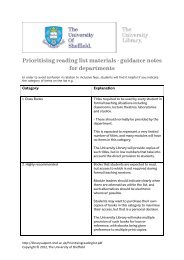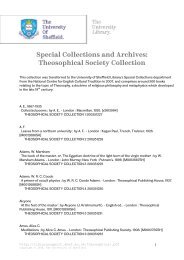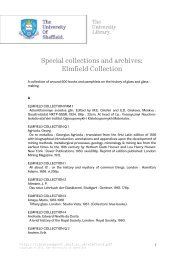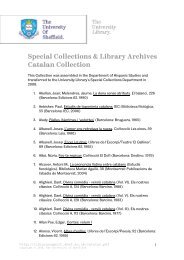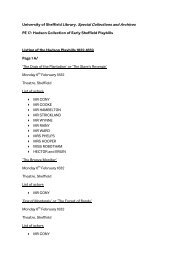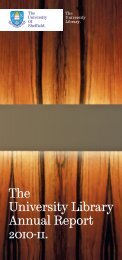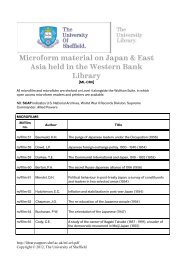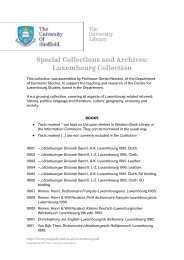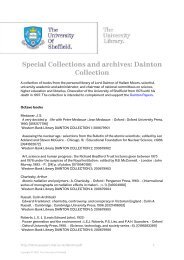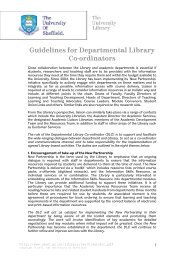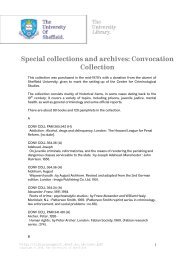The Geoffrey Bullough Collection - Temporary Home Page ...
The Geoffrey Bullough Collection - Temporary Home Page ...
The Geoffrey Bullough Collection - Temporary Home Page ...
You also want an ePaper? Increase the reach of your titles
YUMPU automatically turns print PDFs into web optimized ePapers that Google loves.
Ward, Mrs Humphry, <strong>The</strong> History of David Grieve<br />
Ward, Mrs Humphry, Robert Elsmere<br />
Ward, Mrs Humphry, Marcella<br />
Ward, Mrs Humphry, Sir George Tressady<br />
Wilson, Alexander Johnstone, <strong>The</strong> Rise and Progress of Sir Timothy<br />
Buncombe: An Extra-moral Biography<br />
ANNOTATED CATALOGUE<br />
<strong>Bullough</strong> <strong>Collection</strong> No. 14 <strong>The</strong> Coral Island by R.M. Ballantyne<br />
1. Publication details<br />
Author: Ballantyne, R. M. (Robert Michael)<br />
Author dates: 1825-1894<br />
Title: <strong>The</strong> Coral Island<br />
Publication: London: Nelson, [19--?]<br />
First published: 1858<br />
2. Genre / subgenre<br />
Fiction, boys‘ adventure story<br />
3. Brief Synopsis<br />
15-year-old hero, Ralph Rover, apprentice sailor, shipwrecked on Pacific Island,<br />
together with companions: Jack Martin (18) and Peterkin Lee (13). Narrative of<br />
survival, discovery, adventure (encounters with ‗savages‘, pirates etc).<br />
4. Overview of varieties / dialects<br />
First-person narration, focalised through Ralph Rover. <strong>The</strong> three main characters‘<br />
dialogue is almost entirely standard (although see note at 9), but several less central<br />
characters (sailors / pirates) have marked varieties.<br />
5. Dialect #1: un-named sailors<br />
5a. Sample of dialect<br />
"Cape Horn," said one, "is the most horrible headland I ever doubled. I've sailed round<br />
it twice already, and both times the ship was a'most blow'd out o' the water."<br />
"An' I've been round it once," said another, "an' that time the sails were split, and the<br />
ropes frozen in the blocks, so that they wouldn't work, and we wos all but lost."<br />
"An' I've been round it five times," cried a third, "an' every time wos wuss than another,<br />
the gales wos so tree-mendous!" (p. 14)<br />
5b.1 Orthography<br />
Elision a‟most blow‟d; an‟; o‟ (apostrophe marks each instance)<br />
Eye dialect wos; tree-mendous; blow‟d<br />
Respelling wuss for worse<br />
5b.2 Grammar<br />
Non standard conjugation we wos; the gales wos (although note the sails were<br />
split)<br />
Non standard tenseblow‟d for blown<br />
5b.3 Vocabulary<br />
Idiom I ever doubled<br />
5c. Dialect Area represented<br />
Occupational (generic ‗seafaring‘) rather than regional or social<br />
http://librarysupport.shef.ac.uk /bullough.pdf<br />
Copyright © 2007, <strong>The</strong> University of Sheffield<br />
3





